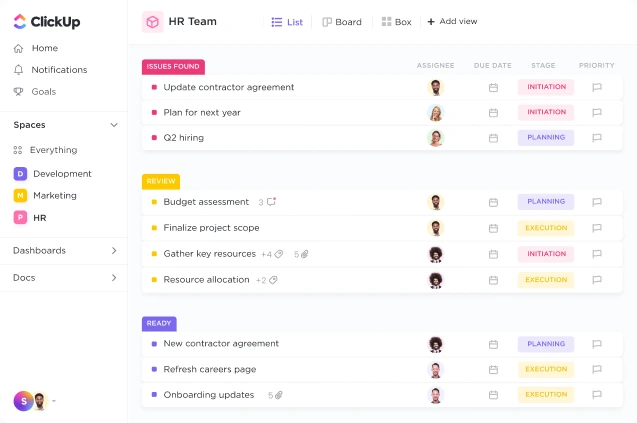Kumusta, Business People! When 60% of companies have adopted performance management tools as part of their HR system, why are you still hesitant to use them?
If your concern is about the best performance management tools vendors in the Philippines, then that concern will be erased after you read this article. It provides valuable insights to guide you in choosing the right vendor.
You will know what kind of system you should use by providing a complete review of the top 16 performance management tools, such as HashMicro. Find tips on choosing the best software vendor to support your business growth in the Philippines.
Key Takeaways
|
Table of Contents
What is a Performance Management Tool?
Performance management tools are software solutions that enable organizations to monitor and improve employee performance effectively. By setting clear goals and tracking progress, these tools ensure that employees stay aligned with business objectives.
Beyond goal-setting and feedback, these tools support employee development by providing personalized growth plans. Additionally, they leverage analytics to deliver valuable insights into performance trends, helping managers make informed decisions.
Benefits of Using Performance Management Tools
Business People, before using tools for performance management, is knowing the benefits it can bring to your company mandatory, diba? For that, here are a series of benefits if you use performance management tools as part of the best HR software in the Philippines:
- Improved goal alignment ensures that employee goals match organizational objectives for focused efforts.
- Enhanced productivity allows employees to boost their performance through real-time feedback.
- Streamlined performance reviews template make evaluations faster and more unbiased for everyone.
- Data-driven decision-making helps leaders make informed choices using insights from analytics.
- Continuous employee development supports career growth and keeps employees engaged.
- Increased accountability holds managers and employees responsible for performance outcomes.
Top 16 Performance Management Tools in 2025 for Businesses
Performance management tools are essential for optimizing employee productivity, aligning goals, and driving organizational success. To help you make an informed decision, we’ve curated a list of the top 16 performance management tools for businesses in 2025.
1. HashMicro Performance Management Tools
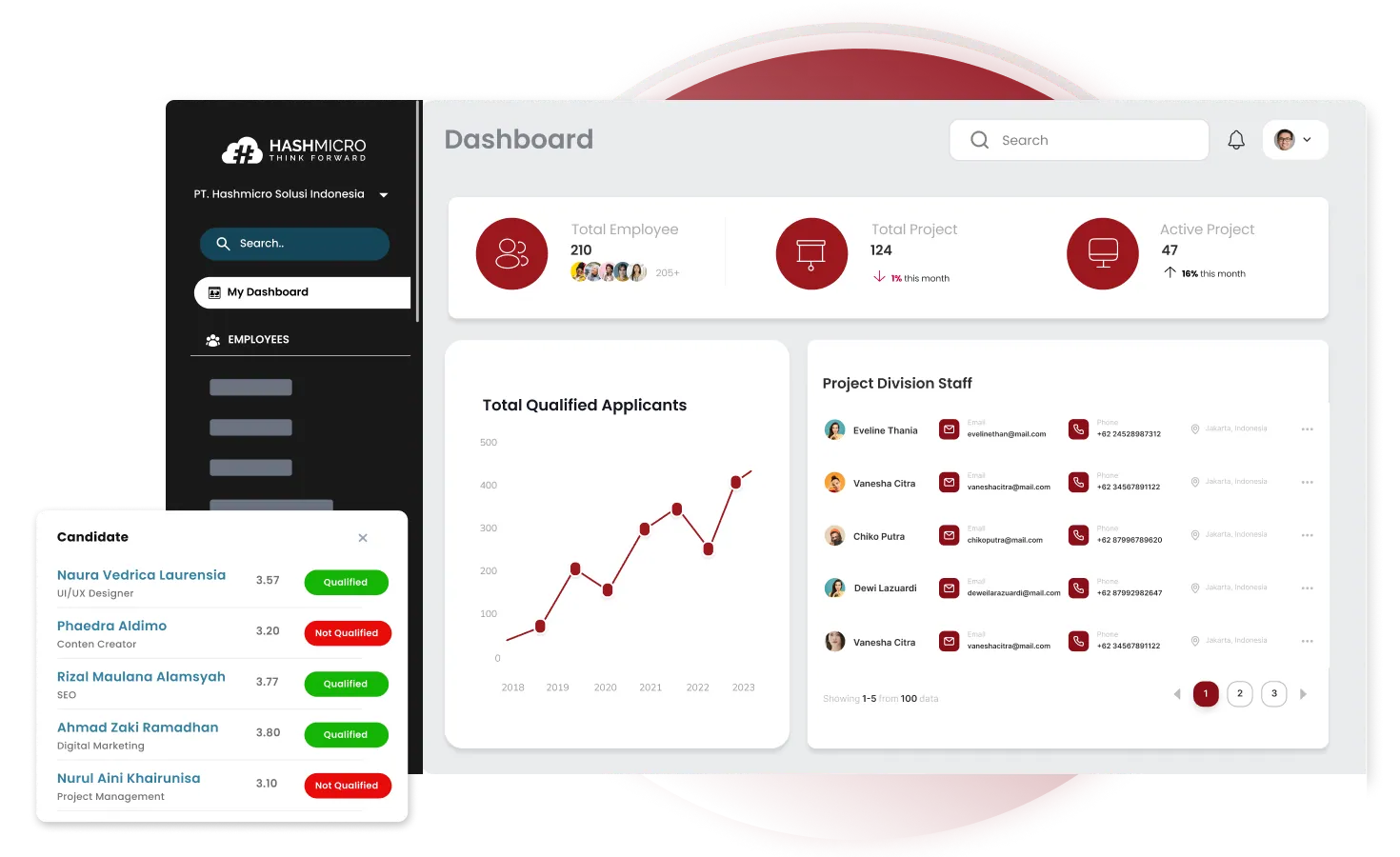
Established in 2015, HashMicro is the favorite choice of more than 1750 Southeast Asian entrepreneurs, including the Philippines. It is not for nothing, HashMicro offers endless benefits to its potential customers, such as free demos, free user add-on fees, and flexible system customization.
HashMicro’s best performance management tools ensure that every employee grows and is aligned with the company’s goals. As the best overall, HashMicro offers the best features, such as:
- KPI-based talent management: Track employee performance using Key Performance Indicators (KPIs).
- Flexible work schedule management: Create and manage employee shifts or fixed schedules.
- Employee development and e-learning: Plan training programs and provide e-learning based on performance reviews.
- 9-box matrix performance analysis: Evaluate current performance and future potential using the 9-box matrix method.
| Pros | Cons |
| Comprehensive reporting | There is a line of free demos available for businesses wanting to try out HashMicro’s HR system. |
| Excellent local customer support | |
| Strong integration with ERP systems | |
| Customizable workflows | |
| The UI interface is user-friendly |
2. BambooHR
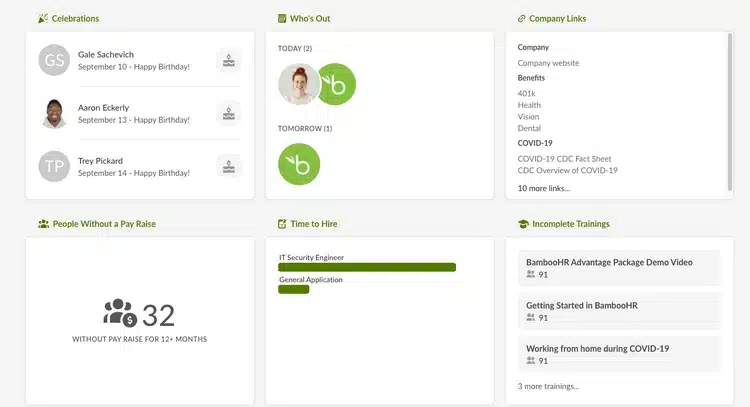
Founded in 2008, BambooHR has an intuitive, cloud-based system. While it started as a centralized enterprise management platform, it has expanded to include powerful tools for performance evaluations. With a focus on usability, BambooHR makes it easy for managers to set goals and track employee progress.
Key features:
- Customizable performance reviews
- Goal tracking and alignment
- Employee self-assessments
- Peer and manager feedback
| Pros | Cons |
| Intuitive and easy to navigate | Limited advanced reporting features |
| Strong focus on employee experience | Customization options are basic |
| Regular updates and improvements | Not ideal for complex organizational structures |
| Solid integration with HRIS tools | Some users report slow customer support |
3. Degree Feedback
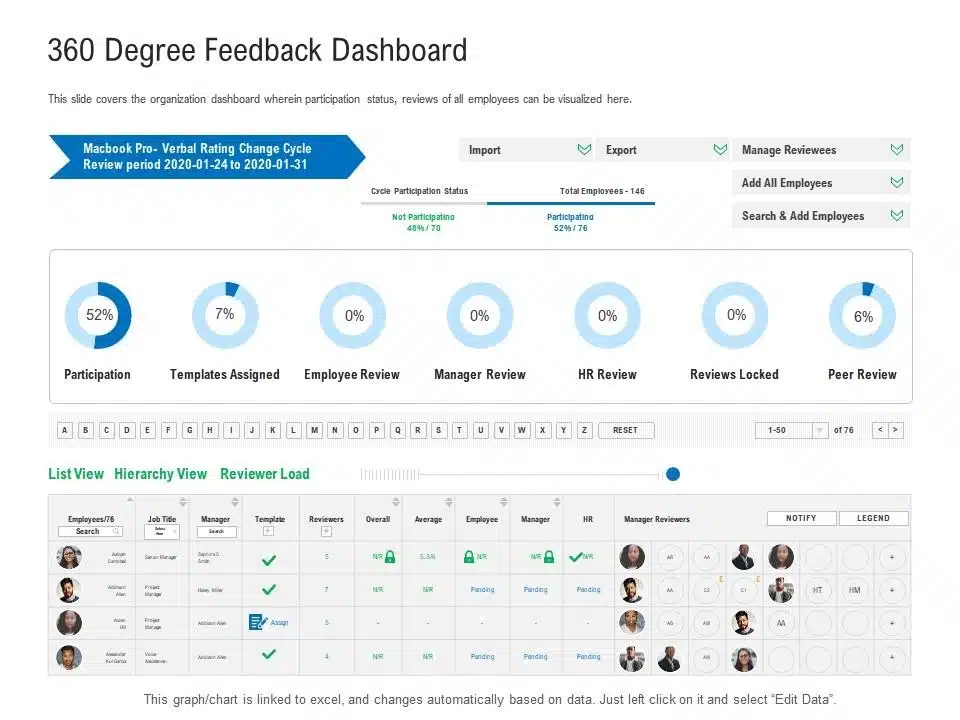
A tool designed around the principles of multi-source feedback, Degree Feedback focuses on delivering well-rounded performance insights. This platform allows businesses to gather feedback from multiple stakeholders—managers, peers, and subordinates—providing a holistic view of employee performance.
Key features:
- Multi-source feedback collection
- Comprehensive reporting tools
- Feedback analysis and action plans
- Built-in survey templates
| Pros | Cons |
| Comprehensive feedback collection | The interface can be overwhelming for new users |
| Built for transparency and inclusivity | Limited integration with other platforms |
| Adaptable for various feedback models | Difficult to set up initially |
| Clear reporting insights | No mobile app for feedback input |
4. Trakstar
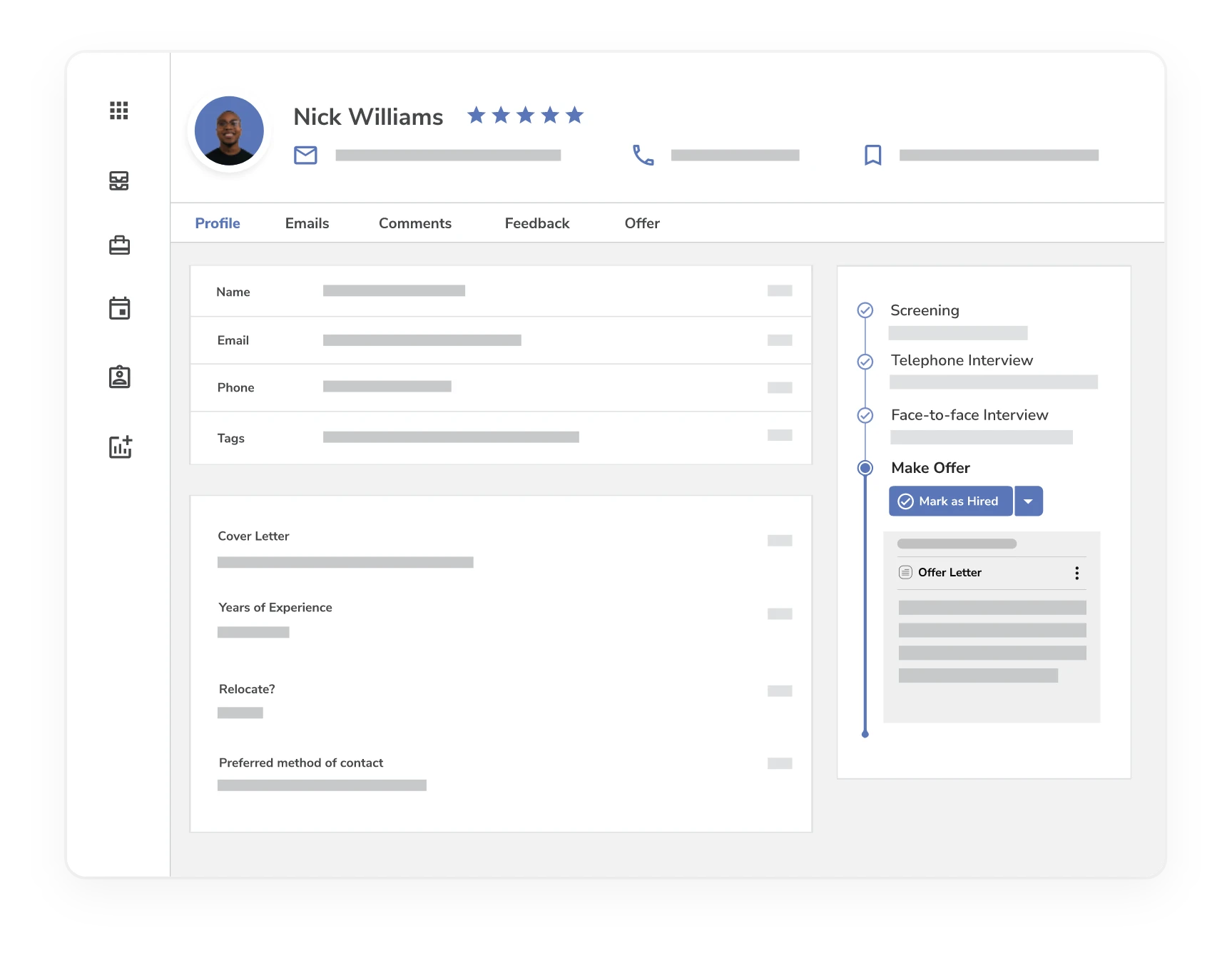
Trakstar has carved a niche in performance management by offering tools that simplify employee evaluations. Its focus is on helping businesses create meaningful evaluations that drive employee engagement.
Key features:
- Employee engagement tools
- Customizable performance reviews
- Real-time feedback features
- Goal tracking and reporting
| Pros | Cons |
| Easy to set up and use | Limited customization options |
| Engaging and modern interface | Basic reporting tools |
| Good customer support | Some advanced features are missing |
| Strong focus on continuous feedback | Integration with external systems can be tricky |
5. Engagedly Inc.
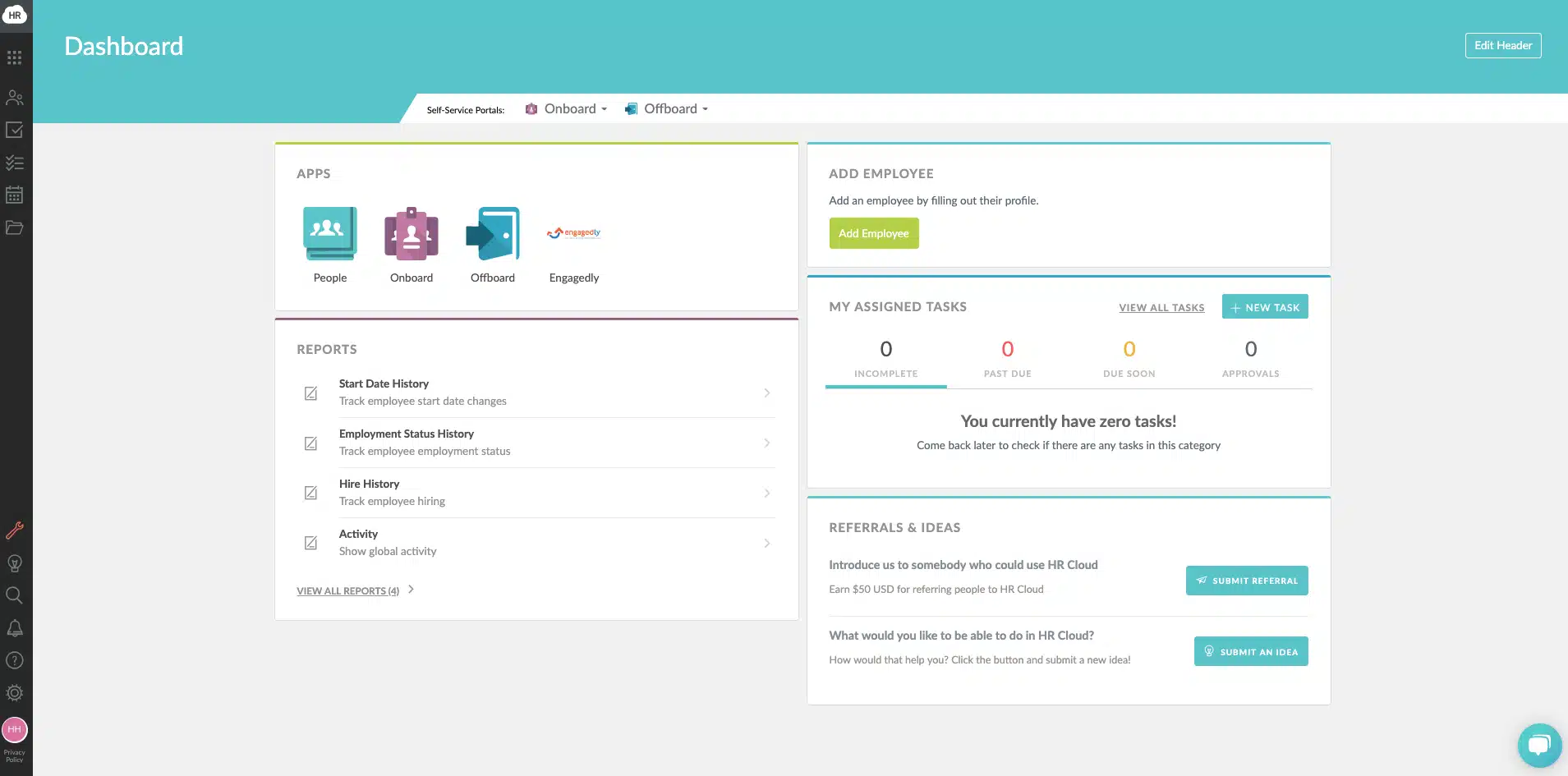
Launched in 2014, Engagedly is a software designed to enhance both employee performance and engagement. The platform offers one performance management, learning, and engagement tool package, encouraging employees to grow while staying aligned with company goals.
Key features:
- Performance appraisals and feedback
- Learning and development modules
- Employee recognition tools
- Goal management and alignment
| Pros | Cons |
| Combines learning and performance tools | Complex setup for new users |
| Focus on employee engagement | Price scaling for larger teams |
| Strong employee feedback features | Lacks deeper integration options |
| Regular feature updates | Limited offline access |
6. Lattice
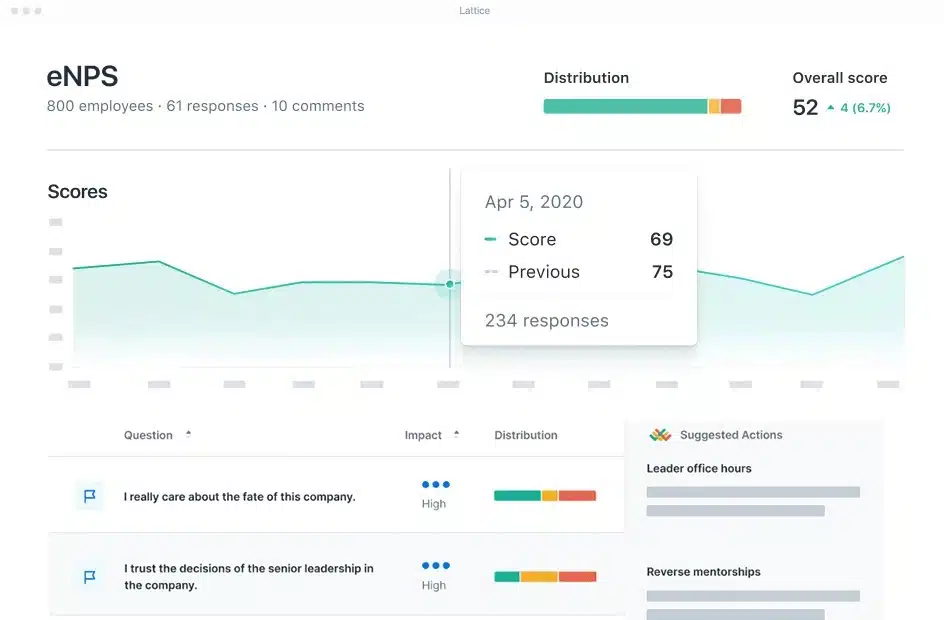
Founded in 2015, Lattice is a fast-growing performance management platform that offers tools to promote employee growth and organizational alignment. The platform emphasizes continuous feedback, development, and transparency, making it a solid company choice.
Key features:
- Performance reviews and feedback loops
- Goal setting and tracking
- Employee engagement surveys
- Performance analytics dashboard
| Pros | Cons |
| User-friendly interface | Limited advanced analytics options |
| Integrates well with other HR systems | More suited for mid-sized companies |
| Continuous development and updates | The learning curve for some features |
| Excellent customer service | Customization options can be limited |
7. Reflektive
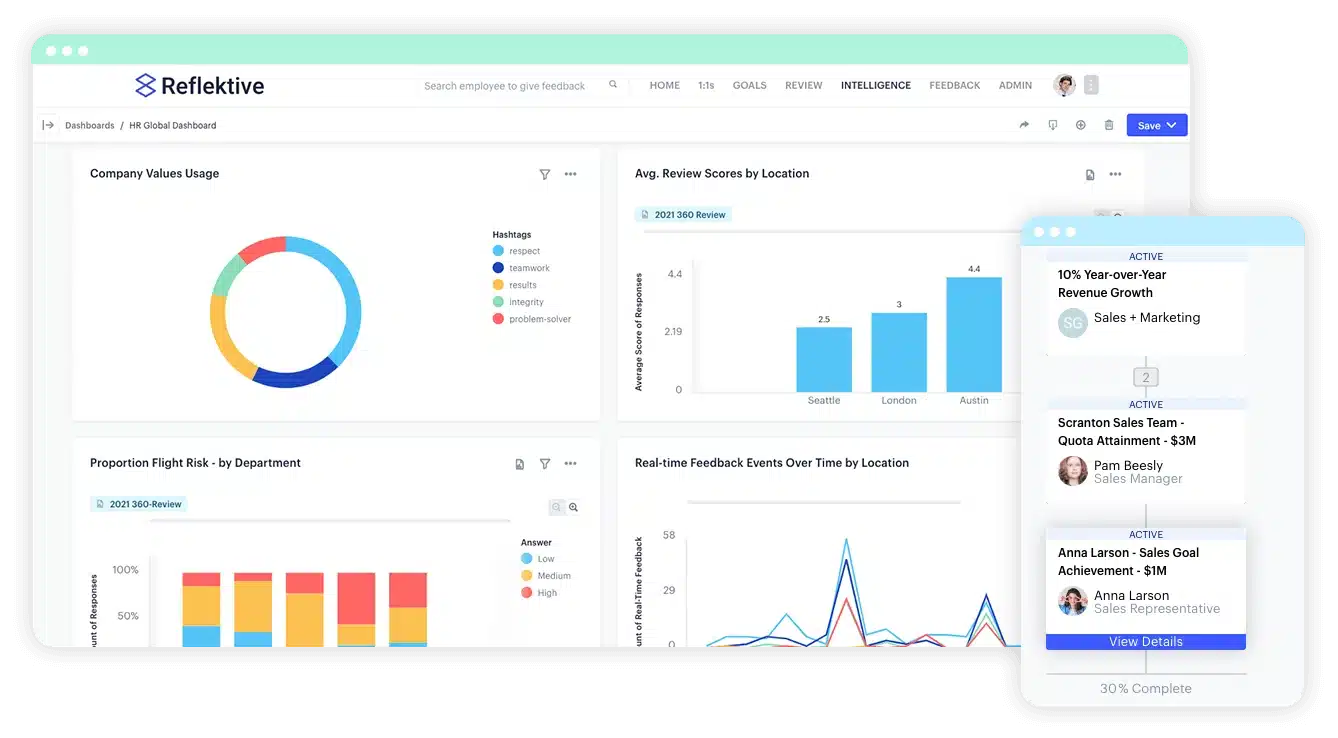
Reflektive is a performance management tool designed to help businesses ensure that their employees’ goals align with the company’s objectives. It focuses on clear, measurable outcomes and gives managers the tools to track progress effectively.
Key features:
- Performance Management
- Talent Acquisition
- Learning & Development
- Employee Self-Service
| Pros | Cons |
| Simple and effective goal-tracking | Lacks deeper performance review features |
| Visual progress tracking | Limited customization options |
| Clean user interface | No mobile support for tracking goals |
| Easy to integrate with task management tools | It can be too basic for complex goals |
8. Perform Yard
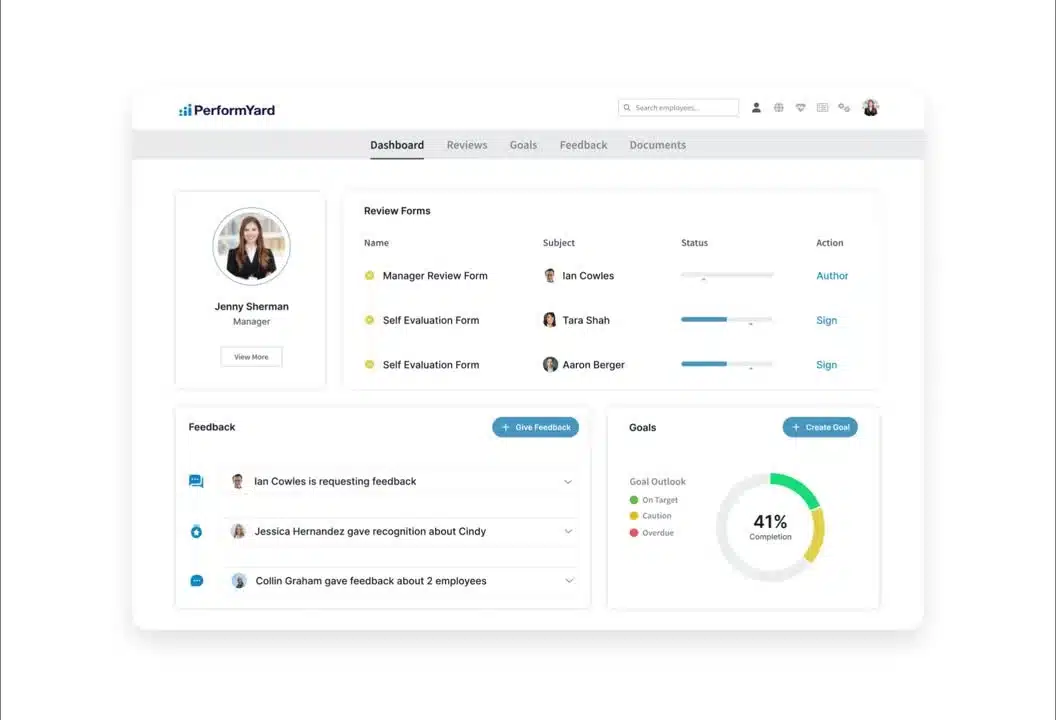
Perform Yard offers a flexible performance management solution for businesses looking for customizable performance review tools. Launched in 2013, it has become a good choice for companies that need a platform adaptable to their specific performance management processes.
Key features:
- Customizable performance review cycles
- Employee performance reporting
- Continuous feedback and goal-setting
- Data-driven performance insights
| Pros | Cons |
| Highly customizable review process | Can be overwhelming for small teams |
| Data-driven reports for performance analysis | Some users report a steep learning curve |
| Strong continuous feedback tools | Limited third-party integrations |
| Visual dashboards for tracking performance | Customer support could be more responsive |
9. BerniePortal
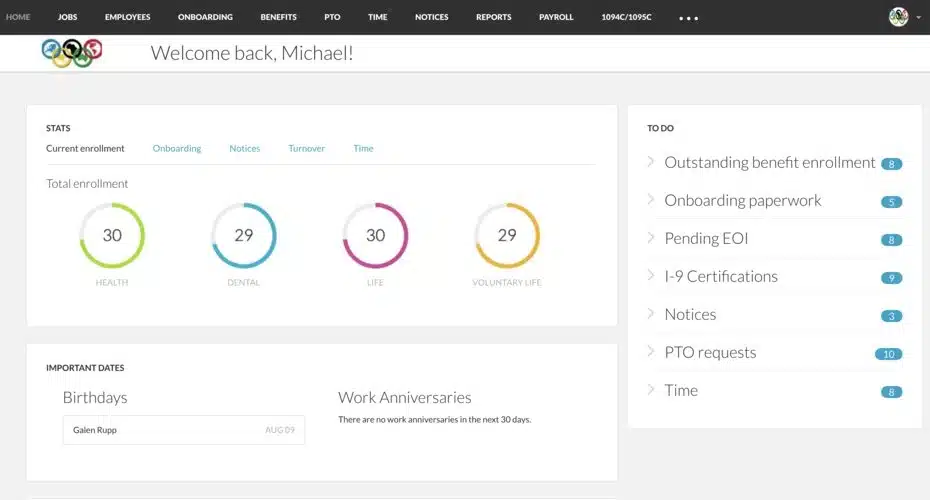
BerniePortal was created to emphasize individual growth and development within an organization. It focuses on providing tools for personal growth while ensuring alignment with broader business objectives, making it a good choice for Filipino businesses.
Key features:
- Recruiting
- Onboarding
- Time & Attendance
- Performance Management
| Pros | Cons |
| Personalized development paths | Limited scalability for large teams |
| Focus on both growth and performance | Lacks robust analytics features |
| Integration with learning management systems | UI can be outdated in design |
| Easy-to-use training tools | Not ideal for goal-heavy workflows |
10. Leapsome GmbH
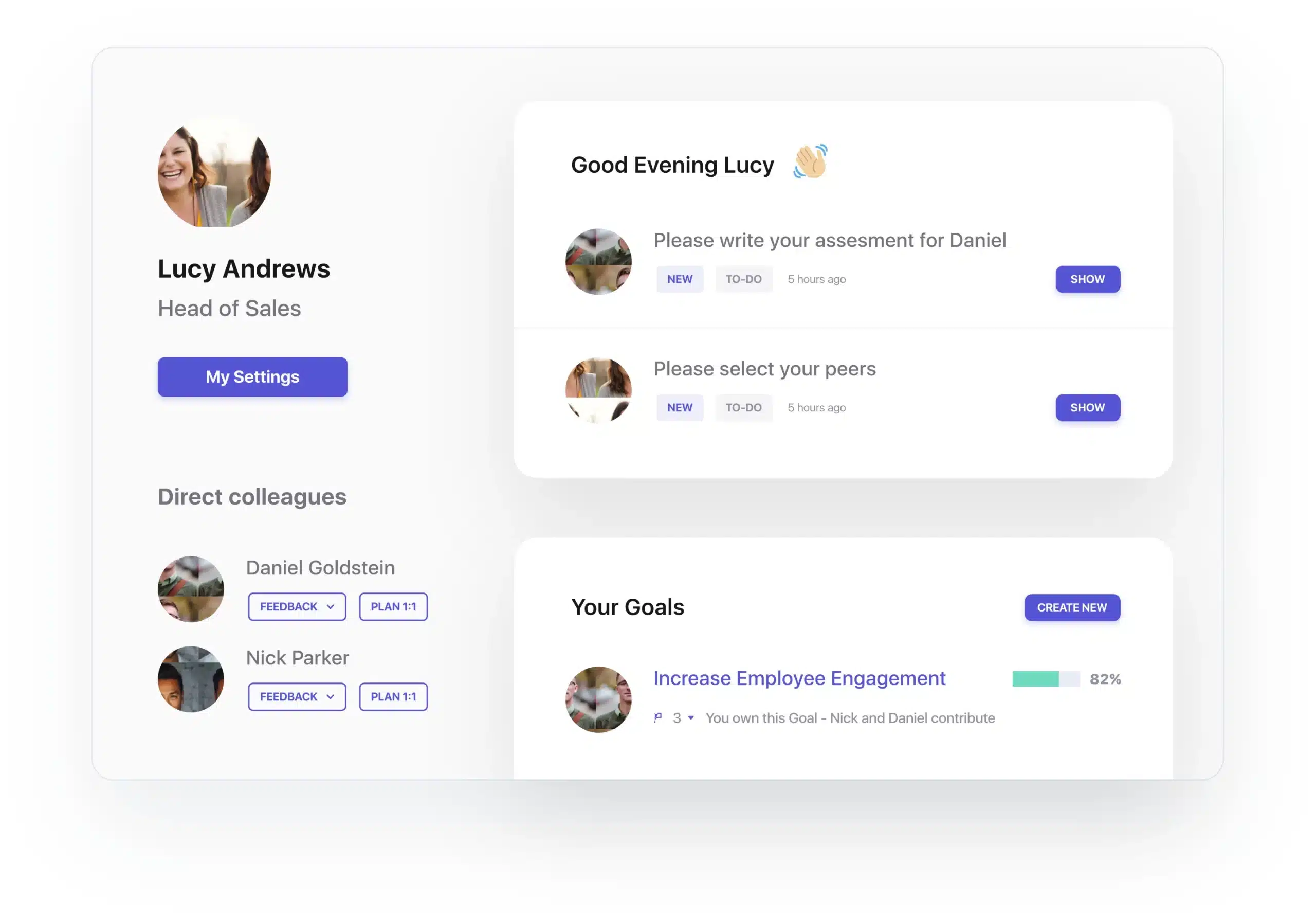
Based in Berlin, Leapsome was launched with a vision to create a people-centric approach to performance management. The platform merges continuous performance evaluations with employee engagement, development, and recognition tools.
Key features:
- Continuous performance evaluations
- Goal-setting and progress-tracking
- Employee engagement surveys
- Customizable learning and development paths
| Pros | Cons |
| Strong emphasis on employee engagement | May lack advanced analytics for large companies |
| Continuous feedback and check-ins | Customization can feel limited |
| Well-designed interface | Some users report limited mobile functionality |
| Employee recognition tools | Steeper pricing for larger teams |
11. Workhuman Conversations
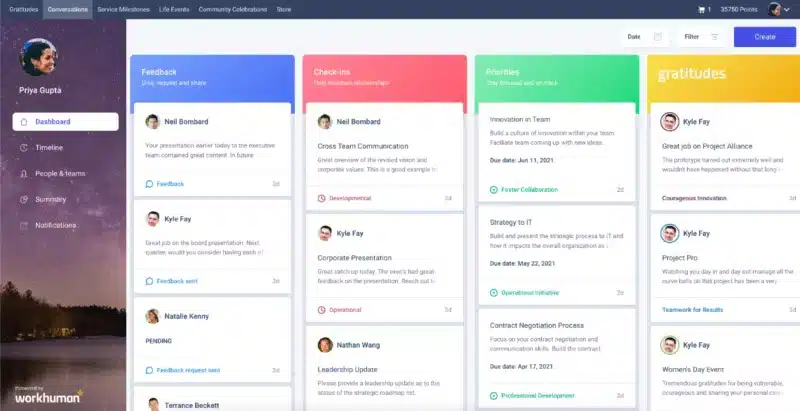
As the name suggests, Workhuman Conversations ties performance management to employee recognition and incentive systems. It’s an ideal platform for businesses that prioritize motivating their workforce through rewards while monitoring performance metrics.
Key features:
- Continuous feedback
- Performance check-ins
- Goal setting and tracking
- Peer-to-peer recognition
| Pros | Cons |
| Incentive-based motivation | Limited integration with external platforms |
| Strong focus on employee recognition | Some users report outdated design |
| Good for teams that thrive on rewards | It can be expensive for larger teams |
| Easy to use | Lack of advanced reporting tools |
12. 15Five
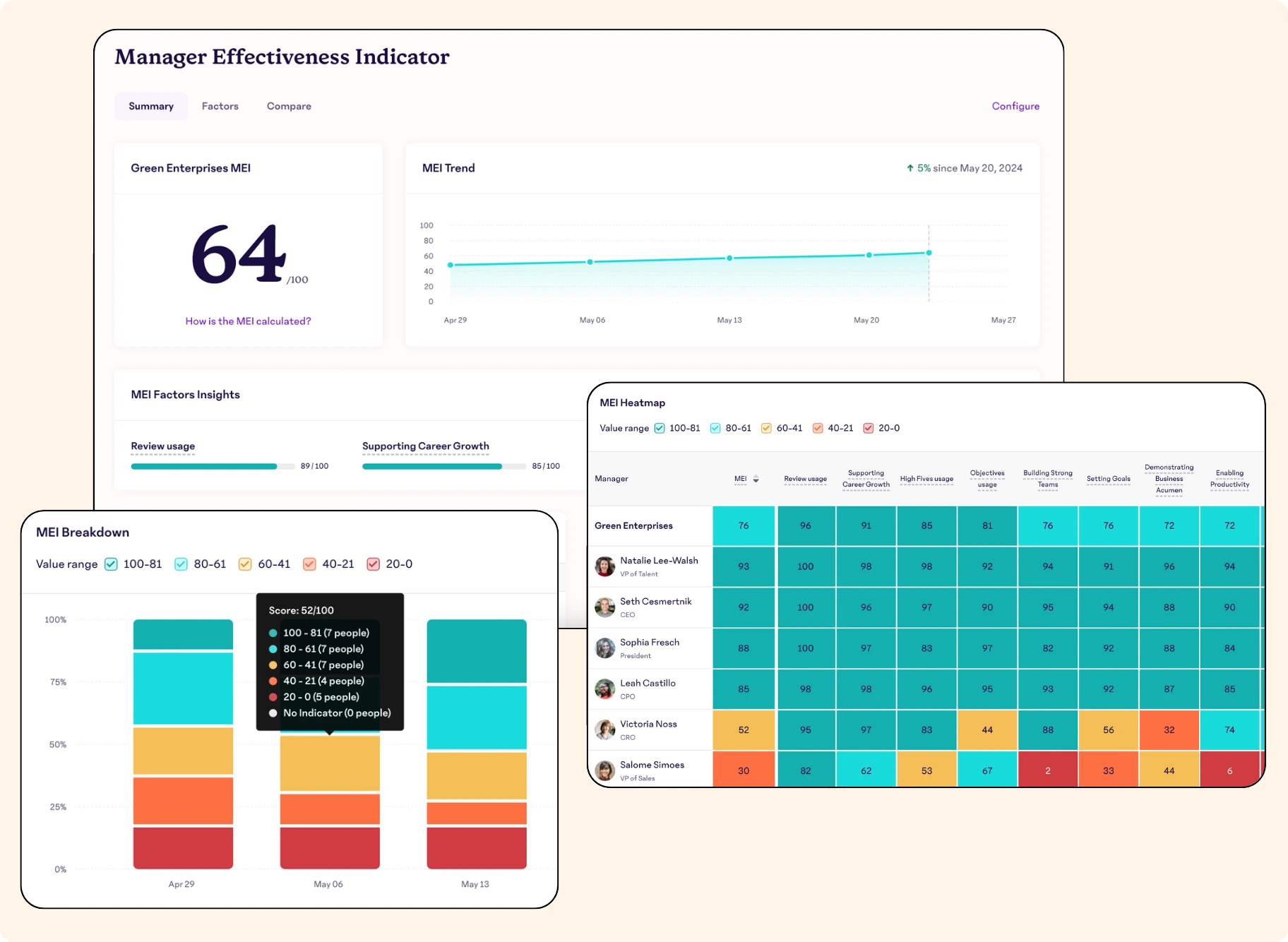
Launched in 2012, 15Five was designed to create a seamless way for managers and employees to stay connected. The platform’s straightforward interface makes it easy for businesses to conduct weekly feedback loops, track progress, and provide continuous development opportunities.
Key features:
- Weekly feedback and check-ins
- Goal tracking and alignment
- Performance reviews
- Continuous development opportunities
| Pros | Cons |
| Simple, user-friendly interface | Limited advanced reporting features |
| Great for regular feedback | Lack of deep integration options |
| Continuous development and growth tools | It can feel basic for larger companies |
| Strong focus on engagement | Steep pricing for bigger teams |
13. Paycor
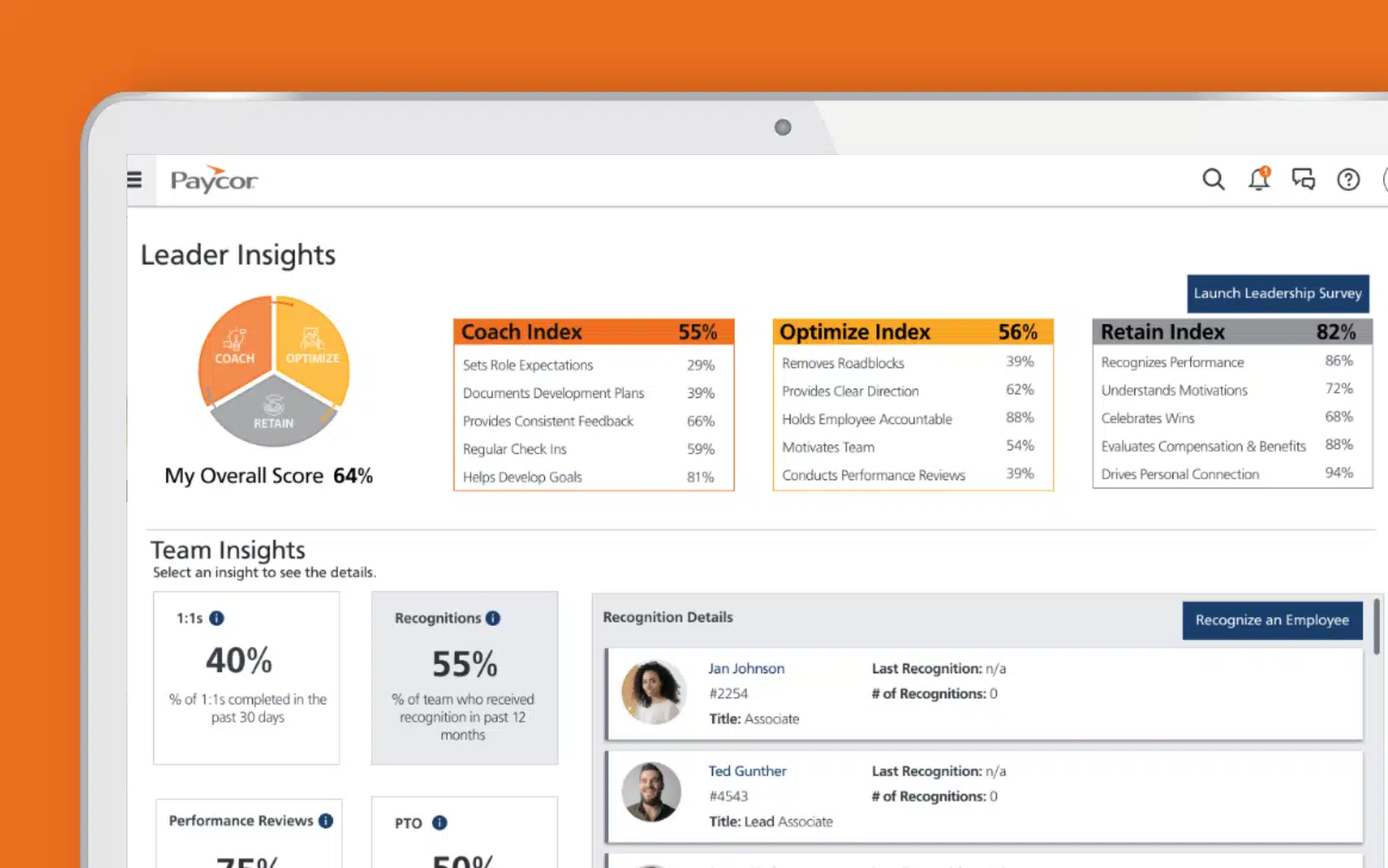
Paycor is a long-standing performance management solutions provider serving businesses since 1990. While initially focused on payroll, Paycor has expanded its platform to include advanced performance management features, offering a comprehensive suite for businesses looking to centralize HR operations.
Key features:
- Performance reviews
- Continuous feedback tools
- Goal tracking and alignment
- Integrated payroll and HR management
| Pros | Cons |
| Strong integration with payroll and HR | It can feel overwhelming for smaller teams |
| Centralized performance and HR functions | UI can be slow at times |
| Good customization options | Customer support can be inconsistent |
| Robust reporting features | The initial setup can be complex |
14. Peoplebox
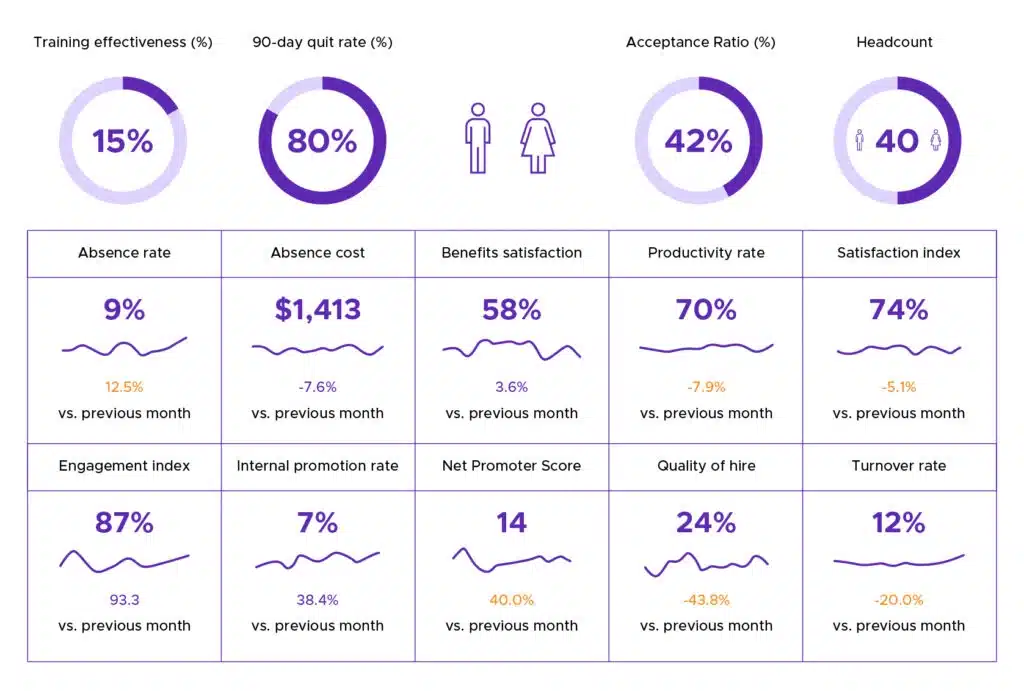
Founded in 2019, Peoplebox combines performance management with business intelligence, giving companies a unique ability to manage employee performance while leveraging data-driven insights. Its focus is on helping businesses align employee goals with strategic business objectives.
Key features:
- Real-time performance tracking
- Goal alignment with business objectives
- Continuous feedback and coaching
- Business intelligence integration
| Pros | Cons |
| Data-driven insights for better decision-making | Some users report slow response times |
| Easy-to-use performance tracking | The steep learning curve for new users |
| Business intelligence integration | Limited integration with third-party apps |
| Focus on goal alignment | Complex initial setup |
15. ClickUp
Why we pick it: ClickUp combines project management with performance tracking, offering a multifunctional platform.
ClickUp has performance management features that make it a good business option. ClickUp allows managers to track employee performance within the context of larger projects, allowing for a seamless workflow between project goals and individual performance.
Key features:
- Task and project management
- Goal setting and tracking
- Continuous performance reviews
- Integration with various third-party tools
| Pros | Cons |
| Combines project and performance management | It can feel cluttered with too many features |
| Customizable workflows | Some users report a steep learning curve |
| Strong task management features | Limited focus on employee engagement |
| Multiple integration options | Performance features feel secondary to project management |
16. AssessTEAM
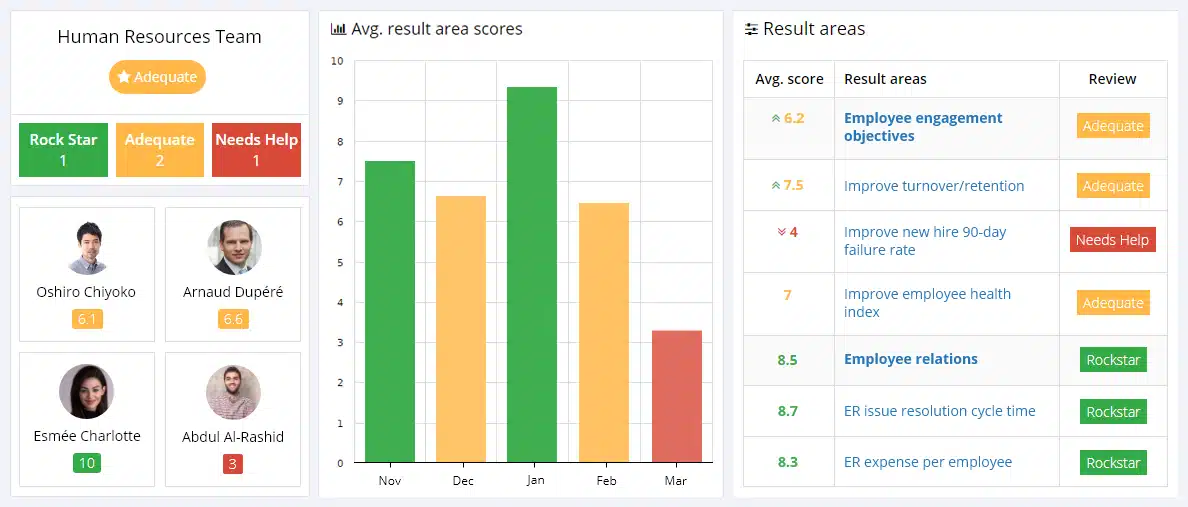
AssessTEAM is a tool designed to provide comprehensive insights into employee performance by collecting input from various sources—managers, peers, and subordinates. This multi-source feedback model offers a balanced view of performance, encouraging growth and accountability.
Key features:
- Multi-source feedback system
- Actionable feedback reports
- Performance insights based on feedback
- Continuous performance evaluations
| Pros | Cons |
| Holistic view of performance | Complex setup process |
| Comprehensive feedback options | Limited integration with other systems |
| Adaptable for multiple industries | It can feel overwhelming for new users |
| Feedback-based performance tracking | Lacks mobile accessibility |
How to Choose Application Performance Management Tools
Business People, imagine if your company, which is ready to implement performance management tools, chooses a vendor that does not comply with local regulations in the Philippines. Not only will this hinder you, but your investment funds could be wasted.
You will have to spend more and invest in another system that synergizes with business needs in the Philippines. Hay naku, ito ay kakila-kilabot! Therefore, preventing the wrong choice by following these steps will help you to choose the best HR software vendor, especially one that offers competency management software tailored to meet local needs and regulations.
- Identify your specific performance monitoring needs to ensure the tool meets your organization’s requirements.
- Evaluate critical features such as real-time monitoring, reporting capabilities, and user-friendliness.
- Consider integration with existing systems to ensure seamless functionality and data flow.
- Assess scalability to ensure the tool can grow with your organization’s needs.
- Read user reviews and case studies to gain insights into the tool’s effectiveness in real-world scenarios.
- Compare pricing models to find a solution that fits your budget while providing the necessary features.
Conclusion
Performance management tools are vital for organizations aiming to boost employee productivity and align individual goals with business objectives. Specifically, they provide numerous benefits if you carefully assess some aspects and choose the best employee performance management tools.
For companies in the Philippines, HashMicro is the top choice among the other 15 vendors. Moreover, its features effectively meet business needs, and the free demo allows potential clients to explore the platform firsthand. Therefore, start your journey to better performance management with HashMicro today!

FAQ About ERP for Pharmaceutical Industry
-
What are the 4 Ps of performance management?
The 4 P’s of Performance are priorities, people, processes, and practices.
-
What is KPI management tool?
KPI management involves strategically setting, tracking, monitoring, and evaluating Key Performance Indicators (KPIs) that are important to an organization’s decision-making and achieving its strategic objectives.
-
How do you handle underperforming employees?
Handling underperforming employees starts with identifying the issue and understanding the root cause. Open communication is key to addressing concerns and setting clear expectations. Provide support through training or guidance, and create an improvement plan with measurable goals. Regularly monitor progress, offer feedback, and consider further actions according to company policy if no improvement occurs.
{
“@context”: “https://schema.org”,
“@type”: “FAQPage”,
“mainEntity”: [{
“@type”: “Question”,
“name”: “What are the 4 Ps of performance management?”,
“acceptedAnswer”: {
“@type”: “Answer”,
“text”: “The 4 P’s of Performance are priorities, people, processes, and practices.”
}
},{
“@type”: “Question”,
“name”: “What is KPI management tool?”,
“acceptedAnswer”: {
“@type”: “Answer”,
“text”: “KPI management involves strategically setting, tracking, monitoring, and evaluating Key Performance Indicators (KPIs) that are important to an organization’s decision-making and achieving its strategic objectives.”
}
},{
“@type”: “Question”,
“name”: “How do you handle underperforming employees?”,
“acceptedAnswer”: {
“@type”: “Answer”,
“text”: “Handling underperforming employees starts with identifying the issue and understanding the root cause. Open communication is key to addressing concerns and setting clear expectations. Provide support through training or guidance, and create an improvement plan with measurable goals. Regularly monitor progress, offer feedback, and consider further actions according to company policy if no improvement occurs.”
}
}]
}











